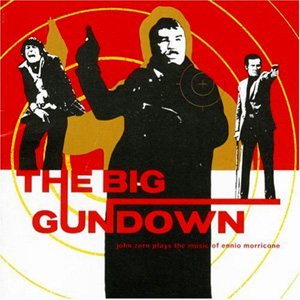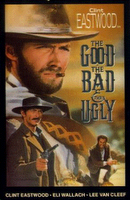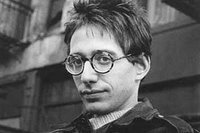 Bob Burnett: Ennio Morricone. You might not know the name immediately, but you'd know his music. All you have to do is hear that spine-shivering whistle in The Good, the Bad and the Ugly.
Bob Burnett: Ennio Morricone. You might not know the name immediately, but you'd know his music. All you have to do is hear that spine-shivering whistle in The Good, the Bad and the Ugly. Morricone was one of the pioneers who changed the boundaries of the soundtrack from being a simple tag-along with the pictures to becoming a new avenue into the reach of a film by expanding the possibility, heightening tension, creating foreshadowing to future scenes, and effecting editing and pacing with his inspired work. In fact, his soundtrack at least once played a pivotal role in how a film was shot. Morricone wrote the music for Once Upon a Time in the West in advance of the film. Director Sergio Leone found the music so compelling that he used it while shooting took place. "Throughout the shooting schedule, we listened to the recording," he recalled." Everyone acted with the music, followed its rhythms, and suffered with its aggravating qualities—which grind on the nerves." The end result was called a "ballet du mort" where the movie's action seems almost choreographed to the atmospheric score. The editing is an incredible mixing of extreme close-ups with expansive wide shots—all looking directly at the soundtrack for motivation.
Morricone was one of the pioneers who changed the boundaries of the soundtrack from being a simple tag-along with the pictures to becoming a new avenue into the reach of a film by expanding the possibility, heightening tension, creating foreshadowing to future scenes, and effecting editing and pacing with his inspired work. In fact, his soundtrack at least once played a pivotal role in how a film was shot. Morricone wrote the music for Once Upon a Time in the West in advance of the film. Director Sergio Leone found the music so compelling that he used it while shooting took place. "Throughout the shooting schedule, we listened to the recording," he recalled." Everyone acted with the music, followed its rhythms, and suffered with its aggravating qualities—which grind on the nerves." The end result was called a "ballet du mort" where the movie's action seems almost choreographed to the atmospheric score. The editing is an incredible mixing of extreme close-ups with expansive wide shots—all looking directly at the soundtrack for motivation. To honor Morricone, John Zorn made a tribute album called The Big Gundown, originally issued in 1984. It is his re-constituted, very personal take on a wide swath of Morricone's soundtracks—and a reflection on the great debt he owes Morricone in his own development as a composer. The Big Gundown was Zorn's major-label debut for his short-lived stay with Elektra/Asylum-Nonesuch; at the time he was mainly known as a free-wheeling, eccentric East Village improvisor and conductor of spirited scores called "game theories." Today Zorn's reach has expanded dramatically, as a player, producer, owner of record label Tzadik, and as a respected soundtrack composer in his own right. Zorn re-issued The Big Gundown on Tzadik in 2000 with five additional tracks as well as a terrific book of liner notes that include thoughts on the production, still images from the films, and Morricone history.
To honor Morricone, John Zorn made a tribute album called The Big Gundown, originally issued in 1984. It is his re-constituted, very personal take on a wide swath of Morricone's soundtracks—and a reflection on the great debt he owes Morricone in his own development as a composer. The Big Gundown was Zorn's major-label debut for his short-lived stay with Elektra/Asylum-Nonesuch; at the time he was mainly known as a free-wheeling, eccentric East Village improvisor and conductor of spirited scores called "game theories." Today Zorn's reach has expanded dramatically, as a player, producer, owner of record label Tzadik, and as a respected soundtrack composer in his own right. Zorn re-issued The Big Gundown on Tzadik in 2000 with five additional tracks as well as a terrific book of liner notes that include thoughts on the production, still images from the films, and Morricone history.The album spans a wide range of interpretations of Morricone's music: loud, raucous, atmospheric, quiet, erotic, and catchy. (Catchy? Yeah, catchy—check out Mike Patton singing "The Ballad of Hank McCain.") While at times having little connection to the original Morricone-recorded version of a composition, there is a very clear respect for the spirit of the work—and Morricone himself wrote in the reissue liner notes that "This is a record that has fresh, good, intelligent ideas. It is a realization on a high level, a work done by a maestro with great science-fantasy and creativity."
So you might want to honor Academy Award winner Ennio Morricone by giving a listen to this very honorable take on his work.
CLICK HERE
CLICK HERE
CLICK HERE

For fans of late 60's and early 70's Miles Davis, the Morricone disc "Gli Occhi Freddi Della Paura" is essential. Great stuff.
ReplyDelete